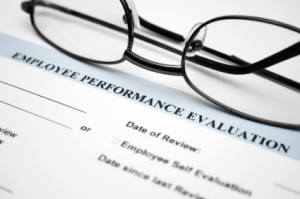 Once or twice a year, whether you like it or not, it’s “performance evaluation time” at your firm. This is usually not a pleasant time of year for you or your employees. So rather than do what you’ve always done, (unless of course everyone at your company looks forward to your process), think about approaching it in a different way this year.
Once or twice a year, whether you like it or not, it’s “performance evaluation time” at your firm. This is usually not a pleasant time of year for you or your employees. So rather than do what you’ve always done, (unless of course everyone at your company looks forward to your process), think about approaching it in a different way this year.
The first question to ask yourself is, “Would I hire this person today, knowing what I now know about them now?” If the answer is “yes,” then good, you have a great place to start the evaluation. Focus on what they do well. Help them get better and find out what they would like to learn and what you would like them to learn to become an even more valuable asset to any company. (In my upcoming book “Putting Together the Entrepreneurial Puzzle – The 10 Pieces Every Business Needs to Succeed”, I discuss how to work with your employees on strengths vs. weaknesses, following the principles of “First, Break all the Rules.”)
If the answer is “no” you have a problem. They are not going to magically get better or be the person you thought they were when you hired them. How much more time do you want to invest in this person, or as I like to say, “the reason for the divorce was likely present on the first date.” If so, time to cut bait. People can learn new skills, but they cannot change who they are. So figure out how you will replace this person and make them available to the industry as soon as possible. As much as they are holding you back from achieving your goals, you are holding them back from finding a spot that is better suited for them.
Now back to your “yes” people. Next question to ask yourself is, realistically, how are you going to challenge this person to grow and keep them interested in staying with your company? For all your high potentials, there are plenty of opportunities for them at other firms, both large and small. Your job is to find out what they really want, what would they like to learn, how can you help them become who they want to be? Learn a skill? Get an education? Is it the working environment that is important to them? The relationships? The customers? You won’t know until you ask and don’t assume. Once you find out, you’ll have a better idea how to create a development plan that will keep them productive while they are with you. Expect that they will leave at some point. Make sure their time with you is mutually beneficial and they’ll always remember what you did to help their career.
Once you know the answers to these questions, it’s much easier to evaluate the employee and come up with a plan that works. Just don’t fudge on the first question, or you’ll end up demotivating your “yes” employees and become a warehouse for the “no’s.”
